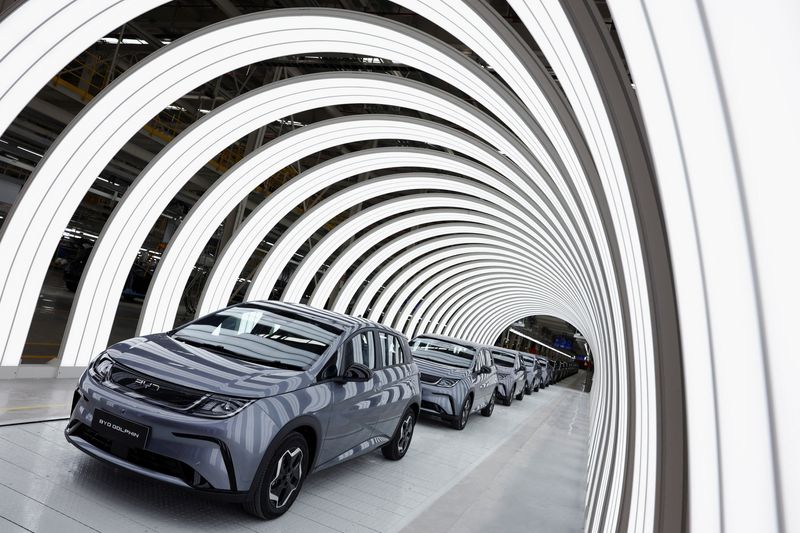Chinese EV maker BYD boosts net profit despite discounts
BEIJING (Reuters) -Chinese electric vehicle maker BYD (SZ:002594 ) reported improved net profits in the second quarter thanks to its extended market leadership, even though it led a protracted price war with aggressive discounts on its best-selling models.
BYD's net profit hit 9.1 billion yuan ($1.3 billion) in the April-June quarter, up 32.8% from a year earlier and its fastest growth since end-2023, while revenue grew 25.9% to 176.2 billion yuan, it said in a stock exchange filing.
Sales of autos and related products accounted for 75.8% of BYD's overall revenue and their gross margin rose to 23.9% in the first half of 2024, up 3.3 percentage points from the same period last year.
Gross margin fell to 18.69% in the second quarter from 21.88% the first quarter, per Reuters' calculations based on its fiscal disclosure.
BYD has taken a significant lead in the Chinese electric and plug-in hybrid vehicle sector, leveraging its vertical integration strategy by using key components such as batteries made by the company.
It has also expanded its international presence, such as in Europe and Mexico, where it has plans to set up manufacturing. The company is facing a 17% additional tariff for exporting EVs from China to countries in the European Union.
"For vehicles priced (in China) under 150,000 yuan ($21,046), BYD holds absolute pricing power because, aside from glass and tires, it manufactures almost everything in-house," said Rosalie Chen, analyst at Third Bridge.
Over half of the cars sold in China are priced under $21,000.
AGGRESSIVE DISCOUNTS
Targeting a 20% jump in annual sales for this year, BYD has been offering aggressive discounts for its best-selling Dynasty and Ocean series of EVs to secure its leadership position with a more than one-third share in China's new energy vehicle market.
BYD has outsold the combined sales of Volkswagen (ETR:VOWG_p )'s two joint ventures in China by 14.5% in the first seven months. It is expected to unseat Tesla (NASDAQ:TSLA ) as the world's largest EV vendor this year with a 17.7% share of the global market, versus Tesla's 17.2%, according to Counterpoint Research estimates.
In Europe it faces additional import taxes by the European Union, which argues Chinese EV production has benefited from extensive subsidies, though China's commerce ministry has denied this and has vowed to take all necessary measures to protect Chinese firms.
Canada and the U.S. have also said they will impose extra tariffs on Chinese EV imports.
Overseas shipments accounted for 11.9% of BYD's total car sales in the first seven months of the year, nearly double the number for the same period last year, according to Reuters' calculations based on BYD's monthly data.
Alongside market expansion, BYD is seeking to bolster profitability through increased sales of its three premium brands - Denza, Fangchengbao, and Yangwang - which together made up 5% of its total sales in the first half.
Under pressure to catch up with rivals, BYD has ramped up its efforts to develop intelligent features, such as advanced autonomous driving systems.
It has invested significantly in hiring thousands of engineers for this initiative, although it still relies on external suppliers for these features in its premium models.
The company uses Momenta's system in its Denza cars and Huawei's technology in the Fangchengbao Bao 8 SUV.
($1 = 7.1252 Chinese yuan renminbi)
Source: Investing.com
